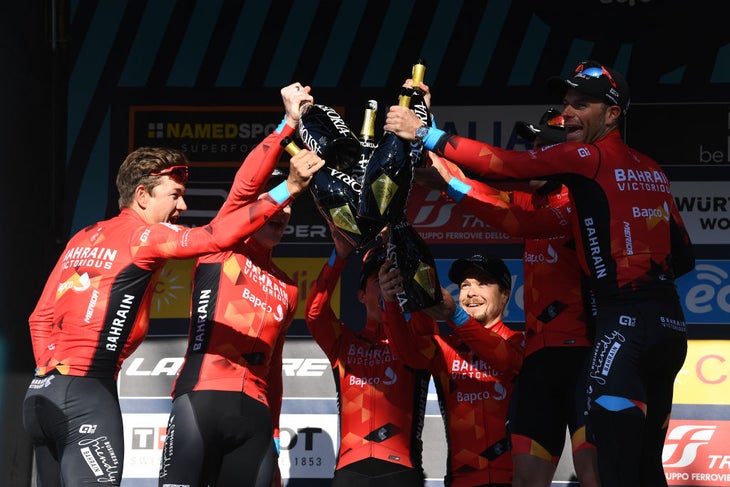The finish-line photo Sunday at Tirreno-Adriatico summed up perfectly where Heinrich Haussler is now in his career.
The image captures Haussler riding along across the line with his right arm held high in celebration. The veteran German-Australian had done his work to help position Phil Bauhaus, and he sat up. When he heard the call over the team radio that Bauhaus won, it was as good as a win for him.
Haussler, 38, came within a bike throw of winning Milan-San Remo in 2009. In one of the most exciting bunch sprints down the Via Roma, Haussler — then only 24 years old — jumped early and Mark Cavendish had to go deep to catch him at the line.
Also read: Tirreno-Adriatico much more than the ‘Pogačar Show’
Haussler, who is skipping this year’s Milan-San Remo ahead of a short break before a full northern classics schedule, knows he won’t be throwing elbows in the monuments this season as he continues his role as mentor. He’s found a good spot at Bahrain Victorious, where he’s road captain and an all-around cycling Wikipedia for a new generation of riders.
VeloNews caught up with him to talk changes at San Remo, the northern classics, and why he thinks Pogačar looks unbeatable.
VeloNews: How are you coming into the classics period?
Heinrich Haussler: I feel good. I’m 38, it’s not like I need to peak and do something for myself. It’s quite easy for me to keep my form and do my job. I don’t need to make it to the 260-270km final, especially with guys with Matej [Mohorič] and Sonny [Colbrelli] really stepping up. It’s more about looking after them and helping the younger guys and teaching them and guiding them, not just this year but also for the future. You just see the younger guys, they’re so strong, they don’t need to use their brains.
VN: Looking ahead to Milan-San Remo, how has the race changed since you almost won in 2009?
HH: It has changed a lot. It’s so fast now. The last 50km is like a full-on sprint. Positioning is so crucial going into the Poggio. If you’re on the 20th position, you’re too far back. They go so fast up the Poggio now the real sprinters hardly have a chance to get to the finish. You can only hope for a headwind or if they look at each other on the top or make a mistake on the downhill. It’s just everyone knows that on the steeper part of the Poggio, that the Wouts, the Mathieus, the Alaphilippes, they’re going to light it up and try to get away. It’s not like it used to be when Cav and me were trying to battle it out.
2009, probably the best ever sprint finish of @Milano_Sanremo . Mark Cavendish at his best catches Heinrich Haussler on the line. Unfortunately, no chance for a rematch this year, Cav is not riding.#MilanoSanremopic.twitter.com/KVxmcXZEax
— Mihai Simion (@faustocoppi60) March 18, 2021
VN: It’s almost as if it should no longer be billed as the ‘sprinter’s classic?’
HH: It’s just the way it’s going to be. There hasn’t been a sprint there for a long time. The level is just getting higher and higher. It’s not a hard climb. If that climb happened after 180km, yeah, it would be a sprint, but if it happens after 280km, it’s just a different race.
VN: We’re seeing riders like Colbrelli and Sagan get sick, is it too late for those guys to be ready for the classics?
HH: You could see at Paris-Nice how many people getting sick. For guys who got corona in December or January, it’s tricky. Sonny being sick now, it’s not ideal. If you’re not 100 percent for the classics, it’s going to be very very difficult. This year is going to be a little bit different. A lot of big names are struggling with form. There could be some surprises. It’s hard to play catch up. You cannot catch up. If you haven’t done the hours and the hard yards in the winter, it’s not possible to catch up right now.
VN: And what about Pogačar? You see him as a winner Saturday?
HH: That’s another thing. It’s a little bit like PlayStation for him. If he wants to go, he’ll go. It’s going to be hard for sprinter teams or other top riders to follow him, because his peak power at the end of the race is so much higher than all the rest of the peloton. It’s going to be the same guys. You can only really hope they get more toward the top and start looking at each, make a mistake, and give the guys in the second row a chance to come back.
VN: What’s your take on Pogačar and his future?
HH: He’s an all-around rider and it’s going to be very difficult to beat him in any race. You have seen UAE have improved across the board. It’s impressive to watch, like Jumbo going 1-2-3 at that stage at Paris-Nice. I respect that. It’s been planned and they do it perfectly, I like that kind of teamwork.

VN: With teams like Jumbo-Visma and UAE Emirates dominating everything, is it harder for teams like Bahrain Victorious to get results?
HH: Not necessarily, because it motivates everyone. Everyone knows you have to step up. You need to ride better as a team, training, watch our nutrition more, it’s everything. For me personally, these guys inspire me.
VN: You’re a team captain now, but what about Paris-Roubaix?
HH: To be honest, it’s not a big goal. I am 38, I am realistic, I know what I can do. I can help the team deep into that race. Last year, I was being a pain in the ass for those guys behind Sonny, blocking them, taking the speed out. The way the conditions were, after the race, I was devastated, cooked, dead, and I said never want to do that again. Cyclocross has helped me a lot, and after a few months, I am really looking forward to it again.
